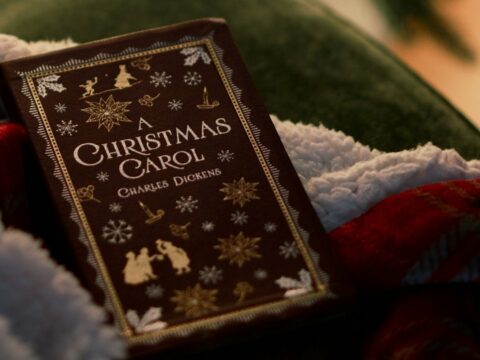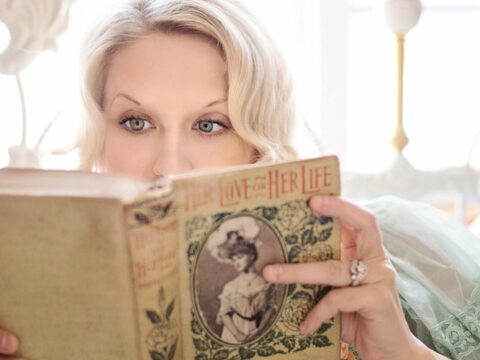Here’s a question for you: how subjective is writing? What exactly makes a book “good” or “bad”? My husband and I were chatting with some friends the other day, and we started discussing the latest AI technology that’s writing song lyrics, poems, articles, and even full books. So far the program seems to produce repetitive yet well-punctuated gobbledygook—when it’s not replicating old ideas of course. Nevertheless, my husband shrugged. He said he figured the program would eventually produce some good creative work after enough tries. Lots of poetry is just random words put together anyway, right?
I admit I almost had a conniption hearing that. Because no, poetry IS NOT just random words that we subjectively decide have meaning. Sure, there are controversial poems that verge on nonsense, but those are the vast minority when it comes to poetry that’s withstood the test of time. Similarly, what makes a book great is also far less subjective than the general population might believe.

There Are Universal Factors that Make Books Good
We all have differing tastes of what we enjoy reading, but popular books get popular for a reason. Famous books rise to stardom for quite objective reasons too. I’ve heard the argument before: writing is so subjective that there is no real standard. English teachers probably have a secret cult that decides which books get studied in school, right?
WRONG. I’m sorry, but I lose my mind a little bit when I hear people talk about how “subjective” writing and books are in general. All because people didn’t like the classics they were forced to study in school. The state of English classes in our public education system is a topic I’ll need to tackle on a different day. Here and now, let’s talk about what actually makes a book great. Because there are some basic building blocks that aren’t based on opinion.
5 Elements that Make a Book Great
1. Strong Command of the Written Word
I’m an editor, people. Syntax, grammar, and overall style of writing are the very first things about any book that matters. Because let’s be honest: even the best idea ever won’t get published if it’s written in hacked, mistake-riddled English. Grammar mistakes are incredibly distracting. We had a saying in my university editing program that good editing clears away the smoke of mistakes so people can appreciate the fire of the author’s message. Great ideas packaged badly don’t have widespread impact.
Now it’s true that many popular books have typos. But I’ve discovered that most of these books are particularly strong in style where they lack grammatical precision. They’re almost always fun and easy to read. They have swift pacing and dramatic chapter endings that make them impossible to put down. Most importantly, popular new releases have openers that hook you right out of the gate; this is how they stand out in the sea of published stories. That is what makes a book great these days.

Of course books that become certified classics take these principles even further. These are the books that use language in a truly artistic way. I’ve read some heartrending books that weren’t easy reads, but they sure were a feast for the imagination. They embraced the beauty of the English language and used it as a tool to describe even the most mundane concepts in a gorgeous way. You get the idea. Great books have better than passable writing. They are well crafted and achieve their goals with words, whether that’s to captivate readers or describe ideas in a beautiful way.
2. An Overarching Message
Simply put, great books in the world have something to say. I should mention that I’m not a total book snob who thinks that popular books are automatically superfluous. Even fun children’s literature can deliver important messages in a sophisticated way. But it’s also true that lots of books are trash because the point of them is to mindlessly entertain. Much like popular soap operas, these books spoon feed readers straight drama without even trying to say anything meaningful. They’re just fun, and that’s perfectly fine for this content to exist.
However, what makes a book great—really great—is when it says something bigger. When you get to the end of the story, you realize that every scene was moving us in a specific direction that was still interesting to read. This is an important element because most readers hate preachy books. Nobody enjoys being condescended to, and there are lots of books that try to say something real while totally missing the mark. Again, packaging matters.
What makes a book great is when it guides you on a fascinating journey that had a point all along. And maybe you didn’t even realize it while you were reading. Subtly is a powerful storytelling skill. I don’t think authors need to be magicians or anything, but it’s impressive when a writer can communicate a powerful overarching message without punching you in the face with it. Across the board, books that have a point to them are always better than books that exist only to turn off your brain.

3. A Plot that Was Thought Through
Of everything that makes a book great, this concept might be the most difficult to explain. What actually makes a good plot? I’ve seen extremely famous authors butcher books by not thinking through major plot issues, so even veterans can mess this one up. But let’s walk through the basics of an excellent plot.
Firstly, plots were not meant to be filled with holes like a slice of Swiss cheese. Well-plotted books don’t have to explain everything, but they do need good logic and a flow of events that makes sense. This requires consistency from the author. If established rules in a story are going to be broken, this choice HAS to make sense. Otherwise the whole plot falls apart. Speaking of consistency, characters need to act “in character” as they’re moving the plot along. Otherwise it’s all just handwavium. If you can see the author pulling strings and making ridiculous decisions to create the plot they want, this automatically makes a book worse. The Wizard of Oz wasn’t magical anymore once we realized he was just an old guy behind a curtain.
Another important aspect of what makes a book great is having an engaging plot. Books that drag tend to get shelved. That’s not to say that every book needs nonstop car chases, heists, and mayhem. But it does mean that great books with great pacing describe only the action that matters. This also applies to quiet, cerebral books with lots of dialogue. Authors pick and choose which scenes to include, and a nice balance of showing and telling is the key to a plot that moves nicely. As a final note, great plots also meet expectations. If you set up a promise early in your story, for the love of all that’s holy, you’d better deliver on that promise. Otherwise you’ll end up with angry readers.

4. Strongly Relatable Elements
Of everything on the list, this might be the element where other authors will disagree with me. Isn’t the point of books to escape your drab normal life and go on an adventure filled with novelty? To this I would answer both yes and no. Let me explain.
One of the biggest things that makes a book great is its humanity. Does this book understand what it’s like to be human? What it’s like to fall in love or face your greatest fear or chase a lifelong dream? I’m of the opinion that in order to be great, a story HAS to touch on the universal experiences that we all share. There’s got to be something relatable for readers to connect with a book. Even books set in strange, fantastical lands can have compelling, relatable characters. Conversely, a book about a completely alien race can unfold in a familiar setting.
Books can contain all kinds of relatable elements: a wish fulfillment we’ve all had, a fear we all secretly harbor, a tragedy that we all agree would be terrible to experience. I’ve addressed this before, but there’s a reason why most classic novels are sad: because the experiences that make human beings cry are intensely universal. Happiness is pretty subjective because we all want unique things. But sadness, death, and disappointment are all instantly relatable emotions. There’s a reason why the most famous books in the world are tragic.
5. Not Easily Forgotten
Lastly and perhaps most important, truly great books have impact. There are plenty of throwaway novels that you forget almost the second you put them down. But what makes a book great is when it leaves you thinking for days, months, or sometimes years. These books haunt you, and they beg to be recommended.
That’s not to say that all great books are going to imprint themselves even on readers with memories like a goldfish. But great books do make an impression because they’re not just coughing up the same old story with the same old characters. They take even familiar tropes and breathe freshness into them in ways that the rest of the books out there don’t. It’s this sparkle of uniqueness that makes great books memorable. And yet it’s even more than that.

I think what truly makes a book great is that it made you feel something while you were reading. It latched onto you because it made you laugh, cry, fear for a character’s life, or think about the world in a way you’d never considered before. Bottom line? Great books stand out on an emotional level that means something. The level to which different people emote with different books can be fairly subjective of course. We all have different tastes and experiences. But what makes a book great is when it carries deep meaning and impact for not just some people, but most people. THAT is what makes a book universal and unforgettable. ❧




